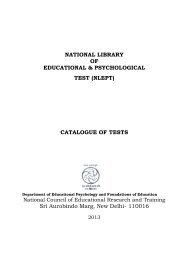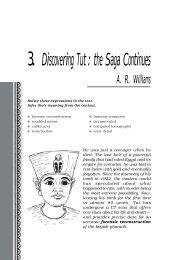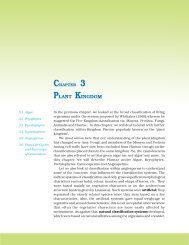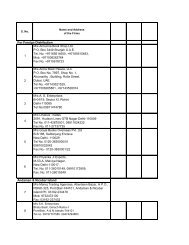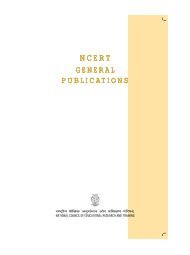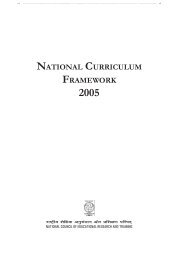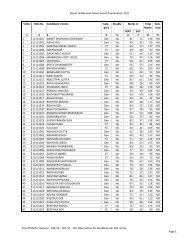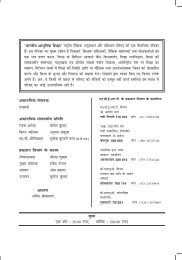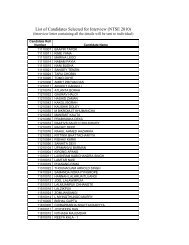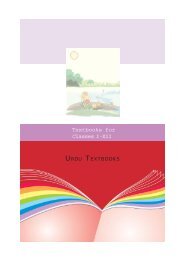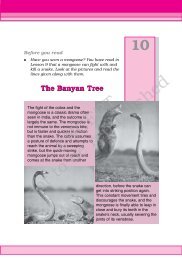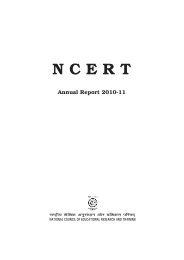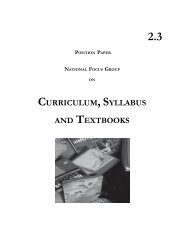indian education - National Council Of Educational Research And ...
indian education - National Council Of Educational Research And ...
indian education - National Council Of Educational Research And ...
Create successful ePaper yourself
Turn your PDF publications into a flip-book with our unique Google optimized e-Paper software.
44 Journal of Indian Education August 2007<br />
recognition with a radiant sense of<br />
human possibilities.<br />
According to Wilson, if human<br />
consumption patterns continue at<br />
present levels we will by 2100 need four<br />
more planet Earths to ‘sustain life as we<br />
know it’. <strong>And</strong> it is fairly well-established<br />
that resource scarcity results in violence.<br />
Krishnamurti addresses these issues in<br />
his philosophy of <strong>education</strong>.<br />
The aim of <strong>education</strong>, according to<br />
Krishnamurti, is to create good human<br />
beings with an awakened sense of<br />
responsibility. The aim is not primarily<br />
to mould them into slots created by<br />
society: professional success, a<br />
comfortable homes and a respectable<br />
family life. These he dismissed as being<br />
narrow, bourgeois and second-hand; as<br />
locked into the short-term vision and<br />
incapable of resolving the problems that<br />
we as a species face. Instead he thought<br />
<strong>education</strong> should be dedicated to<br />
creating ‘good human beings’ with a long<br />
view.<br />
The three main components of<br />
Krishnamurti’s concept of goodness are<br />
freedom, intelligence and responsibility.<br />
<strong>And</strong> all three are the outcome of the right<br />
kind of learning. Learning, for<br />
Krishnamurti, is both a positive faculty<br />
and a negating capability. Learning is<br />
positive because it teaches you about<br />
yourself and the world. It is a negating<br />
capability because it allows the darker<br />
impulses that guide human nature, greed<br />
and violence, to dissolve.<br />
Krishnamurti’s response to a student<br />
who asks him, ‘How can we know<br />
ourselves?’ helps highlights both aspects<br />
of this faculty. The first step in the<br />
process, as he explains very simply, is to<br />
observe as one might in a mirror ‘the way<br />
you talk, the way you behave, whether<br />
you are hard, cruel, rough, patient’<br />
(Krishnamurti, 1974, p. 76). The mirror<br />
reveals what one is, but problems take<br />
hold when one begins to disapprove of<br />
what the mirror shows. ‘The mirror says,<br />
this is the fact; but you do not like the<br />
fact. So, you want to alter it. You start<br />
distorting it.’ (Krishnamurti, 1974, p. 76).<br />
Attention is silently watching what the<br />
mirror reveals, without the desire to<br />
change it. When this silent observation<br />
comes into being there is freedom from<br />
anger, envy and the pettiness that clouds<br />
the mirror. ‘Look’, he says, ‘not with your<br />
mind but with your eyes’ (Krishnamurti,<br />
1974, p. 23).<br />
Over and over again, distinguishing<br />
what is artificial or socially constructed<br />
from what is natural, Krishnamurti<br />
directed students to nature and to the<br />
senses. The senses are tools for<br />
cleansing the mind: ‘Just look at the<br />
stars, the clear sky, the birds, the shape<br />
of the leaves. Watch the shadow. Watch<br />
the bird across the sky. By being with<br />
yourself, sitting quietly under a tree, you<br />
begin to understand the workings of your<br />
own mind and that is as important as<br />
going to class’ (Krishnamurti, 1974, p. 47).<br />
Unlearning the emotions of envy,<br />
greed, anger and ambition is the key that<br />
opens the mind to a wider and deeper<br />
reality, away from its narrow, self-centred<br />
vision. Unlearning frees the mind from<br />
its divisive actions, its tendency to look<br />
at others in stereotypical images: ‘You<br />
are not a Russian or an American, you<br />
are not Hindu or a Muslim. You are apart<br />
from these labels. You are the rest of<br />
mankind’ (Krishnamurti, 1987,72-73).<br />
Krishnamurti’s <strong>education</strong>al<br />
philosophy sought to uncover the



